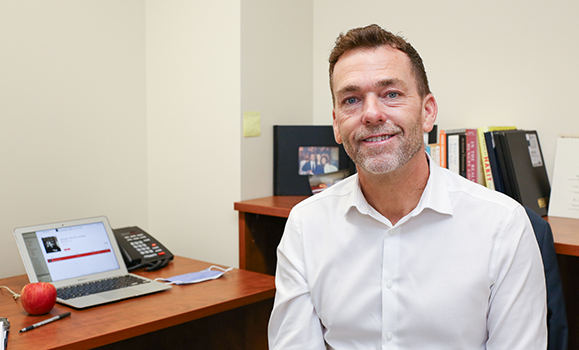At the beginning of 2023, Bryan Fader took the bold step of accepting a newly created position in the Faculty of Dentistry: student success strategist. With a background in sports performance coaching, the role might not appear an obvious fit for Fader, but he would argue that an oral health professional student and a high-performance athlete have more in common than you might think.¬Ý
One year on, he feels some significant breakthroughs have been achieved.
It started with a chance encounter in a Halifax supermarket. Fader ran into his friend Dr. Sachin Seth, the associate dean of student affairs in the Faculty of Dentistry, and they exchanged news. When Fader said that he was finishing off some qualifications for a master’s degree in counselling and psychotherapy, that gave Dr. Seth an idea, which then turned into a job offer: Fader would teach some classes and offer individual counselling sessions.
For Dr. Seth, it made sense. “Student success rarely occurs in a vacuum — it is closely linked with their mental and physical wellbeing. We asked Bryan to help students deal with any personal issues that could affect their academic journey and to provide strategies to help them be more resilient and better able to cope when life gets a bit rough.”
Fader quickly saw the similarities between his new students and the athletes he was used to coaching. “They’re all high achievers,” he explains. “They’re highly driven, they’re intrinsically motivated, they’re used to challenges, and they all feel a pressure to perform.”
Surprisingly, he also discovered that each student felt they were the only one with these feelings and that was because they didn‚Äôt have opportunities to talk openly together as a group. Fader changed this by bringing them together in larger class groups, in a safe space where what they said was confidential, and where conversations about worries and fears could take place.¬Ý
What the students learned, he says, was that they were all experiencing similar doubts and generally feeling they’re not doing as well as they’re doing.
Becoming comfortable with discomfort
Getting into dental school is not easy, so why do such high-achieving students suffer so much from imposter syndrome and anxiety? It turns out their high level of achievement is precisely the problem.
‚ÄúThese students have been the best in their class up until they started dental school,‚Äù says Fader. ‚ÄúFor them, getting an 80 rather than a 90 counts as failure.‚Äù¬Ý
Fader also maintains that students experience an identity crisis as they transition from being undergrads to becoming oral health-care students. They have to ‚Äúlet go of one rope in order to grab the next one,‚Äù he says, and that makes them feel uncomfortable.¬Ý
“I try to normalize that sense of discomfort so that the students don’t feel that something is wrong,” he adds. “Their role is changing, and they will feel discomfort as they progress from rope to rope.”
A strategy Fader recommends for people struggling with anxiety is to adopt ‚Äúhorizon vision.‚Äù He explains that a feeling of stress tends to speed things up. ‚ÄúThe more we drop our heads down, the faster the world gets because we‚Äôre seeing it more closely.‚Äù¬Ý The technique originates in treatment of anxiety in general, but Fader has also used it to help athletes. ‚ÄúIt‚Äôs useful for any kind of performance,‚Äù he says.

Fader also encourages students to understand how stress is felt in their bodies. “People often make the mistake of fixing the challenges they’re experiencing in their head with other thoughts in their head, rather than fixing their bodies. That’s why how we hold ourselves and our breathing matter so much. It helps us to slow down before we get into flight mode.”
An expression Fader says he uses a lot is ‚ÄúHow you do something is how you do everything.‚Äù It‚Äôs another technique he encourages students to adopt. ‚ÄúWhen does the patient experience start?‚Äù he asks them. He maintains that preparing to see a patient involves preparation, rather than waiting until they are in the dental chair.¬Ý
“With difficult conversations, challenges, feeling overwhelmed, and seeing a patient, if you practice how you want to be, when the moment comes, you’re way more ready,” he says. “It’s much better than trying to pull yourself up in the minute before something happens.”
Harnessing strength
One of the important pillars he shares with students is the concept of desirable difficulty. “When I pitched this concept to the class, one guy said, ‘Dude, we have enough difficulty. We don’t want any more.’”
The response is understandable, says Fader. But he maintains that when you push yourself, even in a small way, you build a muscle.¬Ý
‚ÄúThink about going to the gym,‚Äù he adds. ‚ÄúThe weights shouldn‚Äôt be lighter. The students need to get stronger.‚Äù¬Ý
He maintains his role is to help the students realize they are stronger than they think, and to provide the tools and strategies to harness that strength.
Looking ahead, Fader says that he wants students to know that they don’t have to be in crisis mode to reach out to him. “Therapy tools are life tools,” he says, “and the more we can work together to strengthen students’ abilities to handle stress — and even welcome it — the deeper their life satisfaction will be and the more prepared they will be for what the future brings.”
Recommended reading: Always evolving — Teaching award winner Dr. Sachin Seth puts students first

